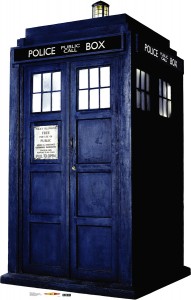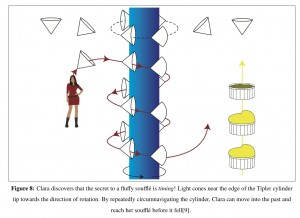Question Barn 1
me and jocelyn answer question!
tiphyter@titaniumphysics.com
me and jocelyn answer question!
tiphyter@titaniumphysics.com
Hi everyone,
planning on recording the next episode this sunday. really looking forward to it.
but I thought it was worth making a note…
A lot of people are talking about BICEP2.
We spoke about their tentative findings on episode 45: gravitational waves from the inflationary epoch were causing light in the cosmic microwave background to twist and spiral and curl in a detectable way. a very big deal, for reasons we discuss on the show.
the new news is that maybe the BICEP2 people will have to scale back their claims. It turns out that they didn’t have a very sophisticated picture of where the dust around our galaxy was (it was still being mapped at the time) so when we apply the more sophisticated picture of dust, it *looks* like most of the pinwheel light comes from dust instead of gravitational waves.
the question I am here to answer is: what am I going to do about it. Take the episode down? Add a blerb at the start of the episode about how everyone sucks?
I am not going to do anything about it.
So yeah, I’m not going to do anything. In 100 years, all our episodes will be outdated. This particular one just went sour 10 or 20 years before I expected it to. Science is like that.
-bn
p.s. There is a trend (is it a trend?) in science outreach to rely heavily on news to bring in and hook science aficionados. String theory? naming the higgs boson the “god particle”? I like revolutions in theory and experiment as much as the next guy, but science isn’t a horse race. It’s slow, and sometimes researchers get ahead of themselves, and other research drags them back to their place.
So when I choose my shows, I *usually* only choose topics which are part of the well established canon of explanations. That is to say, If you asked physicists in the field how something worked, they would mostly agree. The kind of thing that gets printed in undergraduate textbooks, you know? I have been deliberately staying *away* from the forefront of physics, because it’s a tree where branches are constantly being pruned away or dying of old age. Not that it’s not exciting, or that the people involved are not super clever… It is and they are… but from the audience perspective, finding out that a topic you heard about is not true.. it’s kind of disheartening? it makes you want to give up on paying attention, you know?
And that’s why we stick to topics which are pretty well established both theoretically and experimentally. As I said above, I expect most of our explanations to be usurped in the next 100 years… but that’s plenty of time.
So why did I break with my pattern and cover BICEP2? it’s because the inflation model IS ALMOST canon in cosmology. It’s ubiquitous and *pretty much* accepted, theoretically. Like the Higgs boson, there’s still theoretical room for it NOT to exist, but less work would be involved for everyone if it DID. I have resisted, since the start of the show, doing inflation as a topic because it had not been verified experimentally. The BICEP2 results gave Inflation the observational verification it needed. (also, it involved a lot of great physics!)
TL:DR “Meh. that’s science for ya.”
Heh.
So on a recent show with Taylor Mali, he asked us… essentially, why scientists thought they knew everything? I suppose from an outsider perspective we act like we do. And indeed, we understand SO MUCH. But we were quick to correct him: we make no claims for universal understanding, nor is the joy of science the smugness of knowing a ton. No, the joy of science is in exploring that which is NOT known. the frontier of our understanding is vast, and being wrong (and occasionally right) about our guesses are the reason we get out of bed.
anyway. I’m super happy, because today I WAS WRONG. and wrong in a big way.
I am sure that you’ve read the headlines.
the deal is that I would put (a small amount of) money on two things, up until last week:
1. Inflation is a cosmological solution to an aesthetic/philosophical problem, and that it probably didn’t happen. and EITHER WAY, we would never know because there aren’t any detectable signals which would be distinguishable.
2. Primordial gravitational waves will never be detected, directly or indirectly.
Indeed, part of my PhD thesis involved some simulations which spat out spectra for primordial gravitational waves. So part 2. was RATHER PESSIMISTIC on my part. nevertheless…
I WAS WRONG on both points!
AND ITS AMAZING! I’m LITERALLY BUZZING WITH EXCITEMENT!
now listen, nothing is certain, and everything should be taken carefully and conservatively…
but it’s amazing. I’m amazed.
Also, up until now, many of my experts had suggested a show on Inflation, and I’d always said no… because there were no observational verifications.
so. I’m happy to say that the next episode of the titanium physicists podcast, we’ll be talking about inflation, and the exciting news.
but tonight? CAkE!
Ben Tippett: Hello, my name is Ben Tippett. I’m a physicist, and a university math instructor. I study black holes and gravity stuff.
Barn: Hi. I’m a little white rabbit who knows how to type.
BARN WAS ASKED TO INTERVIEW BEN ABOUT HIS TARDIS PAPER , IF YOU WOULD LIKE TO READ A MORE SYSTEMATIC EXPLANATION, TRY READING THE BLUE BOX WHITE PAPER , WHICH SUMMARIZES ALL THE IDEAS FOR A NON-TECHNICAL AUDIENCE.
Barn: Okay, so you said that no one ever interviews you and that you’d like  someone to interview you about this TARDIS paper you wrote, but also you wanted me to do it because I’m a fictional rabbit and so I know all the right questions to ask.
someone to interview you about this TARDIS paper you wrote, but also you wanted me to do it because I’m a fictional rabbit and so I know all the right questions to ask.
BT: yeah.
Barn: okay… so. This TARDIS paper. TARDIS usually stands for “Time and Relative Dimension In Space”. Why isn’t that the acronym you used in your paper?
BT: uh. It’s not very descriptive. The acronym “Time and Relative Dimension in Space” is evocative of Einstein’s Theory of spacetime, but it doesn’t really mean anything. so we went with “Traversable Achronal Retrograde Domain In Spacetime,” which means that it’s a box that can go backwards in time and move faster than the speed of light.
Traversable Achronal Retrograde Domain In Spacetime.
it’s a more descriptive acronym than “time and relative dimension in space”
The TARDIS is a time and space machine that Dave and I have been working on since january. I was trying to make Alcubierre warp bubbles go in a circle and it didn’t work so I made this instead. It’s a bubble in spacetime that goes along a closed loop in spacetime. here’s the cool bit. while it is going BACKWARDS in time, the arrow of time inside the bubble is opposite that of the arrow of time outside the bubble.
Anyway it’s pretty fun.
So the deal is that I’m going to try to publish the paper. So the actual paper is a little bit technical. You need to say a lot of jargon to make people realize that you’re not a crackpot. Ironically.
Anyway, for everyone else who wants to know about this thing, We’ve written a “white paper”… a little review paper that tells you the background and summarizes the results. It’s super fun. We talk about all sorts of background information and als o there are a lot of fun diagrams.
o there are a lot of fun diagrams.
So check out our review article: “THE BLUE BOX WHITE PAPER“.
Holy donk everyone,
i haven’t said anything because it always seemed to be around the corner.
at the very end of july, a day before we recorded the show with mur lafferty, we recorded a show about quantum computing.
but the audio quality was butt.
immediately after recording it, I drove across the continent, and then suddenly had a job interview, and then had to move to a new city and find and apartment. and then I had to start teaching a full course load with hardly a moment’s notice.
okay, so.. in the second half of august i finished editing the aforementioned episode. and i sent it to john. poor john. he works so hard.
and he chiselled and chiselled away at the horrible audio quality.
so i finally told him to give up.
the audio quality wasn’t going to get any better.
and it’s been so long since we released an episode.
so… without further ado. ..
So Dr. Jocelyn went to the LA Podfest!
(thanks, brachiolope media network!)
I’ll post more as they come in.
(the next episode is being worked on by John. The sound quality of that one is HORRIBLE. poor John. pray for him. pray to Atheisto.)
So, we’re a finalist in this year’s parsec awards for the “best fact behind the fiction podcast“. This is pretty exciting. The parsec awards are curated awards, and the
The winners are determined by a panel of judges. The fact that we made the shortlist is an amazing honour. It really speaks to the quality of all of my titanium physicists, as well as all of the wonderful guests who have given us their time.
The parsec award winners are announced at Dragon*Con, in Atlanta. The Ceremony is September 1, at 5:30 in the Hyatt Regency V Ballroom.
I won’t be able to attend, and I’m not certain that I’ll be able to dispatch any of my titanium physicists. But If you can go, I’d love to hear from you.
The Spooky season is upon us.
Based upon some bragging I did on the brachioboard this spring, and some goading encouragement by dave and jocelyn, I came up with a unified theory of Cthulhu.
People like it when you call your thoughts a “unified theory”.
Anyway.
It’s based off of HP Lovecraft’s story “the call of Cthulhu” (listen here)
specifically, i was able to describe all of the crazy things which the sailor Johansen sees upon the corpse city of R’lyeh using my mad general relativity skills.
I even did some computing and rendered (not drew. RENDERED) a picture of how the island would look bonkers because of gravitational lensing. @_@
but heres the thing…
In proving the Johansen wasn’t crazy I accidentally figure out that cthulhu is probably real, responsible for the island… and I also figure out what he’s doing down there. Of course, as a brave man of science, i can’t go and admit that Cthulhu exists… but you can tell…
Anyway. It’s wonderful and all general relativity.
I’m putting it on the arxiv as we speak, so it should be making weird waves in a day. but in case power goes out or something, I thought i’d tell the podcast about it.
it’s currently on the Arxiv. so you can go there to download it if you want.
Hi so.
I was recently back on Podcast Squared. It’s Andrew Johnstone’s podcast about podcasts. You’ll remember Andrew From Episode 13 about Ice Cube.
Anyway, Andrew and The Tolkien Professor and I talk about using podcasts to educate people, both formally (as in school) and informally (as in not school).
It was a lovely conversation, and it should be fun to listen to if you’re interested.